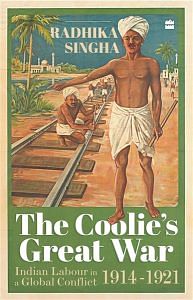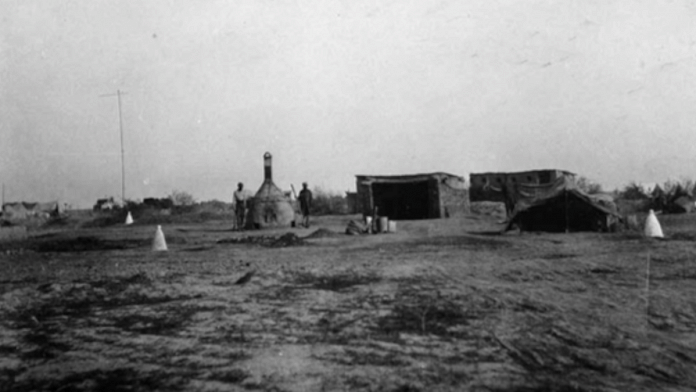In the bleak spring of 1916, a note from Mesopotamia complained bitterly about the tardiness with which India was responding to desperate calls for military labour:
Could there possibly have been a greater opportunity for India with millions of men not usable as soldiers, to take a larger share in the war, or even a larger share in helping its own Indian Army? From all accounts India was burning to get such a chance, yet what happened? The honour of India was upheld first by aborigines and then by convicts.
Delays in sending manpower and ‘parsimony’ in sanctioning funds—these were the recriminations heaped upon the Government of India after the disasters which overtook the British invasion of Ottoman Iraq at the close of 1915. One response was that in India only specific communities, the so-called martial castes and races, could be recruited as soldiers. The question that hung in the air regarded the supply of labourers and followers. After all, India, with her population of 320 million, seemed to have a vast reservoir of coolies.
Convict sweepers and the mission of sanitary reform
In March 1916, among the letters and telegrams flowing in from Mesopotamia which called for labour of every possible description, we find a letter marked ‘confidential’ and pressing for 450 latrine sweepers. One of the reasons for this secrecy was that news had spread about military setbacks and harsh living conditions in this theatre, and military and civil authorities were discussing the option of impressment. In addition, cholera had broken out in Basra— something which had to be concealed from those being sent into the thick of this epidemic. In this context, the Quartermaster General in India suggested the assistance of the Salvation Army, ‘already largely connected with Doms and [the] class from which latrine sweepers are drawn’. Frederick Booth-Tucker, Special Commissioner for the Salvation Army in India and Ceylon, proposed that sweepers be recruited from jails using Section 401 of the Criminal Procedure Code, which allowed conditional release. He also suggested that some ‘Dom’ communities, targeted as ‘criminal tribes’ in India, could be tapped:
in Gorakhpur and other districts members of the Dom tribe not yet ordered into settlements but who it is desired to bring under control, should be given the option of enlisting as sweepers, but failing this they should be required to find security in the usual manner, and if they fail, should then have the same offer repeated to them in lieu of going to jail.
Also read: New book uncovers forgotten tales of Indian Army ‘coolies’ in World War I
Some background will explain why a Quartermaster General turned to a Salvation Army Commissioner when sweepers were required. As pointed out in the previous chapter, work regarded as ‘traditional’ for certain ‘untouchable’ communities often turns out to be an occupation forged under modern institutional and economic imperatives. Vijay Prashad has shown how much the equation between latrine sweepers and the community known as ‘Chuhras’ owes to colonial municipal and public health drives. Under one such drive, some of the communities being registered as ‘criminal tribes’ were forcefully made over into sweepers for municipalities and military cantonments. This was also the conjuncture at which the Government of India was drawing upon missionary organisations, in particular the Salvation Army, for assistance in turning ‘stigmatised’ and ‘vagrant’ populations into useful labour. Such exercises were cast as measures through which the ‘welfare’ of such strata could be secured and their potential criminality contained.
However, at this conjuncture the government was single-mindedly concerned about getting sweepers, whereas the Salvation Army clung to its broader agenda of social and moral transformation. Booth-Tucker wanted ‘the wives and families of prisoners and tribesmen … to be ordered into a Salvation Army settlement, to be supported by a family allotment of Rs. 8/– deducted from the wages of each sweeper.’ The Home Department concluded that high-handed intrusion into domestic life would compromise recruitment, and decided not to involve the Salvation Army for fear of associating recruitment with proselytising. Instead, provincial governments were directed as a matter of ‘utmost importance’ to get prisoners to volunteer as sweepers. In addition, district magistrates of the United Provinces and Bihar and Orissa were urged to recruit sweepers from among the criminal tribes of Doms, noticeably in Gorakhpur, Saran, and Champaran, who, although not in jail at the moment, are always more or less on the verge of it. If the opportunity of earning an honest and lucrative living were explained to them, in preference to the precarious mode of living which they now follow … it is to be hoped that further recruits might be obtained.
At the level of such a deeply ‘polluting’ occupation, the line between criminal and low-caste mattered little. Jail recruitment could be used without embarrassing questions about the degree of pressure used, and no particular offence was regarded as a bar to service; the Home Secretary noted that ‘[n]o one is likely to worry much where we get sweepers from’. The blurring of this line had one advantage for jail-recruited sweepers. They were initially given the same wage, Rs. 15/–, as free sweepers, a decision attributed to the higher risk of disease they faced. There may have also been fewer restrictions on them because they were not organised into a distinct Labour Corps. Lane commented disapprovingly that ‘[t]hey were in every sense “free” in the Force, so much so, that two jail-recruited sweepers, who had been in the country under a year, were given leave in the spring of 1917 from some unit.’ This fact became known because a Jail detachment at Qurna found out and asked for the same privilege.
Also read: The British used ‘low-caste’ Indian soldiers only when WWI intensified, rejected them after
With suspicious swiftness, no less than 1,017 prisoners were found ready to ‘volunteer’ to go to Mesopotamia as sweepers in 1916. Securing sweepers in sufficient number was crucial to the improvement of military hospitals in Mesopotamia, an issue on which the British public demanded reassurance. By autumn 1916, the accumulation at Basra of one Egyptian and ten Indian Labour Corps, together with dock labourers and craftsmen for the Inland Water Transport, had built up fears of a sanitary catastrophe. As one Health Officer observed: ‘in the first years of the British occupation, I suppose on an average there was no square yard of open space in Basrah free from a faecal deposit.’ Where homes did not have cesspits, any open space was used. The solution, he wrote, was to build latrine blocks with receptacles fashioned from disused kerosene tins, and to dispose of the solid waste in incinerators: ‘For this work the Indian sweeper caste were imported, and they trained a number of Arab sweepers—although it must be admitted that the Arab never took kindly to these duties.’Health reports from Mesopotamia give us a glimpse here and there of the Indian sweeper engaged in this mission of sanitary reform.
However, municipalities and jails in India could not be entirely denuded of sweepers, so ‘untouchables’ in the Indian Labour and Porter Corps and among the hospital followers were also hustled into latrine work. Some of the men in the Jail Corps resisted this work, arguing ‘that they were only sent out to sweep mule lines, and remove litter … but they would not deal with human excreta.’ Others, wrote Lane, claimed that they did not know they had been brought out for this task.
Some of those who refused were sent back to India to serve their original sentence; others were given no choice at all. Colonel Patrick Hehir, Assistant Director of the Medical Service, admitted that ‘[a] certain proportion of those sent out were of the wrong class: many of them would not at first do conservancy work in latrines, although the conditions of field service necessitated our compelling them to carry out whatever duties were assigned to them.’ There is a tragic entry in the war diary of the 14th ILC recording the summary court-martial of one Medid Ramaswamy, for attempting to commit suicide by tying his legs and neck with his turban and throwing himself in the river. He was sentenced to six lashes, the officer noting that ‘[t]he case was very unfortunate as the fault lay with the Enlister. The man being of a caste which could not do sweeping work.’
 This excerpt from ‘The Coolie’s Great War: Indian Labour In A Global Conflict 1914-1921’ by Radhika Singha has been published with permission from HarperCollins India.
This excerpt from ‘The Coolie’s Great War: Indian Labour In A Global Conflict 1914-1921’ by Radhika Singha has been published with permission from HarperCollins India.




It’s not India , Foolish print journalists, it’s Britishers who sent sent prisoners to Iraq, why can’t you ask this now with England and Iraq embassy , They will show your place in this world, Foolish journalists like you guys know everything , But don’t want real painful issues about public, But want to propogate hate towards your own country, which feeds you, what a shame PRINT MEDIA
The title should read ” BRITISH INDIA” rather than “INDIA”.
Your hatred for india comes out in the headline….u idiots should have said Britishers forced india
Why use the “India” word in the headline, why not put the original emphasis on British Colonial India?? Why this much baising??
Why use the “India” word in the headline, why not put the original emphasis on British Colonial India?? Why this much baising??